Unit 9 Have you ever been to a museum?Section B 1a-2d 课件 2021-2022学年人教版八年级英语下册 (共42张PPT)
文档属性
| 名称 | Unit 9 Have you ever been to a museum?Section B 1a-2d 课件 2021-2022学年人教版八年级英语下册 (共42张PPT) |
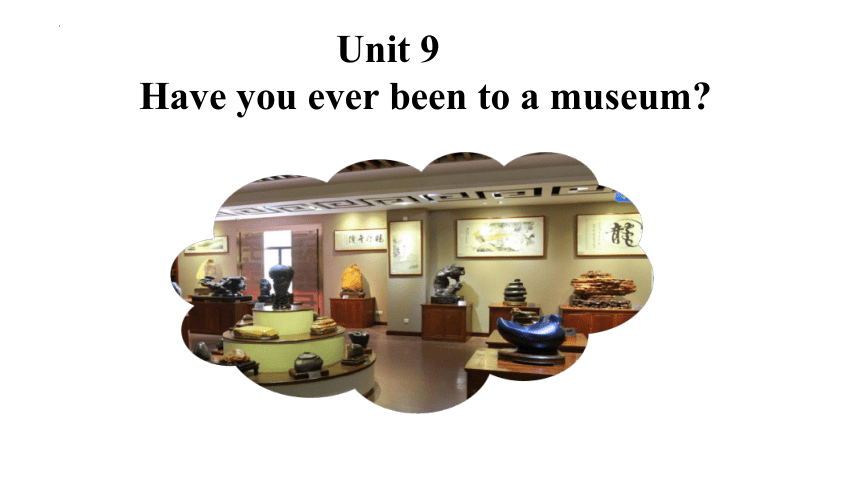
|
|
| 格式 | zip | ||
| 文件大小 | 11.5MB | ||
| 资源类型 | 教案 | ||
| 版本资源 | 人教新目标(Go for it)版 | ||
| 科目 | 英语 | ||
| 更新时间 | 2022-07-30 00:00:00 | ||
图片预览


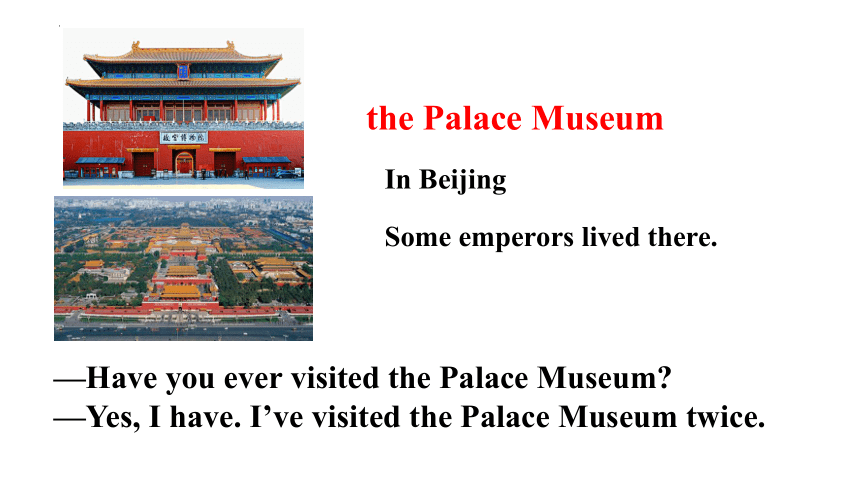

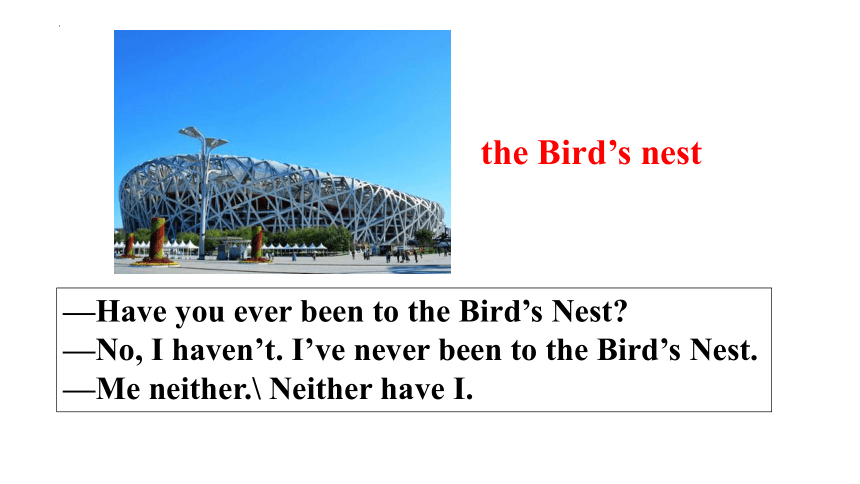
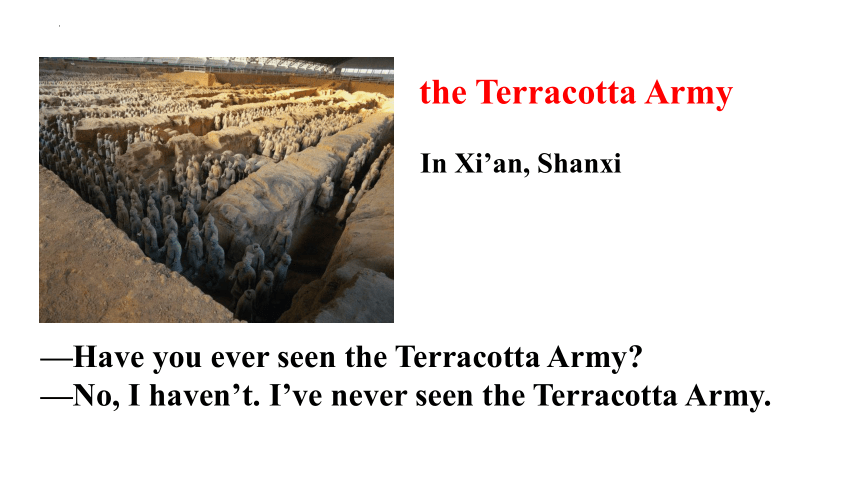
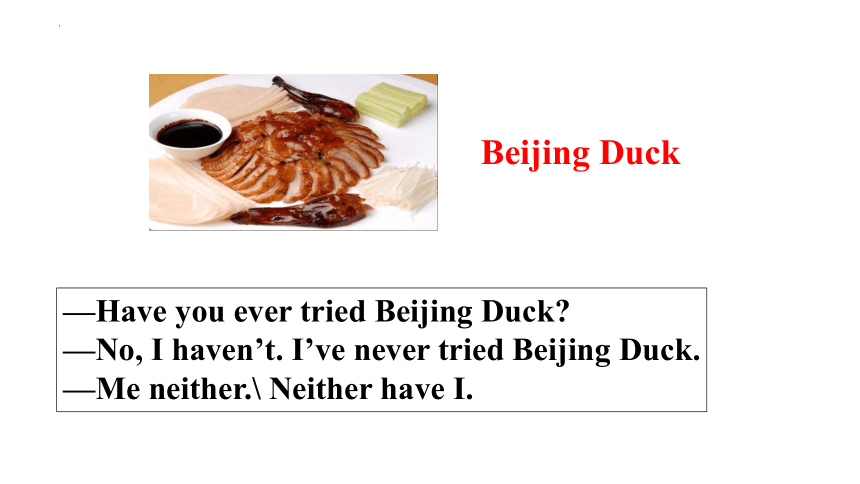
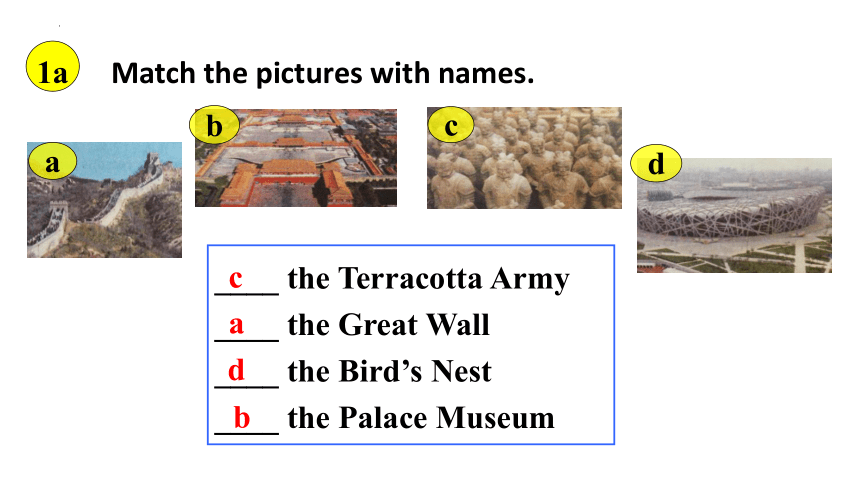
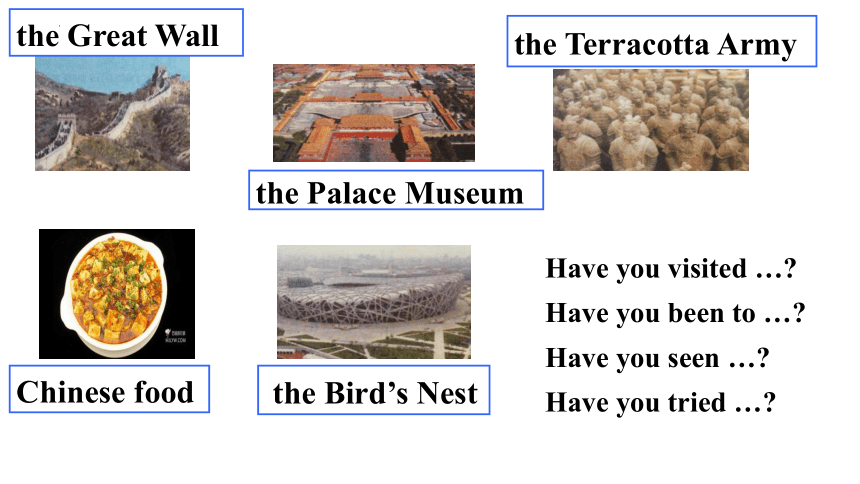

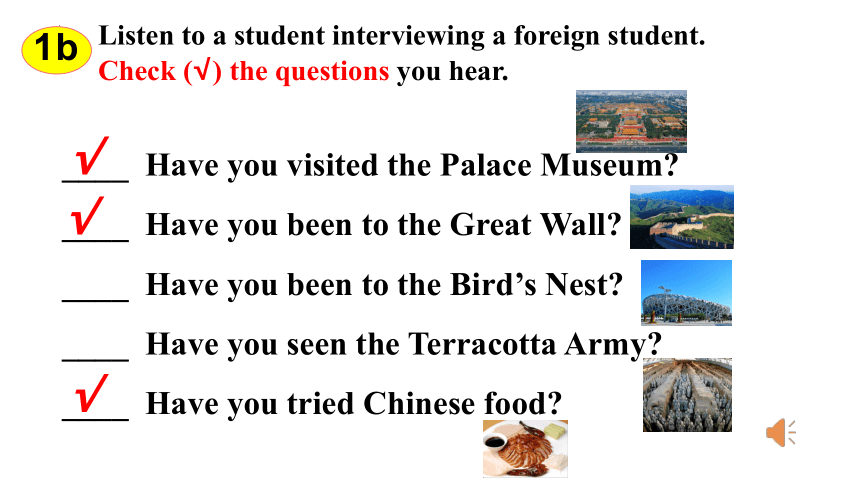
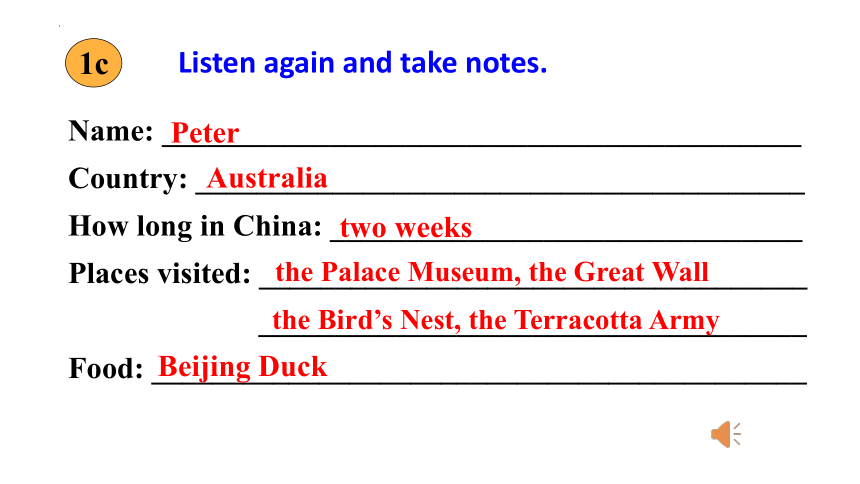
文档简介
(共42张PPT)
Unit 9
Have you ever been to a museum
Do you like traveling
What places of interests(名胜古迹) do you know in China
Leading in
In Beijing
Some emperors lived there.
the Palace Museum
—Have you ever visited the Palace Museum
—Yes, I have. I’ve visited the Palace Museum twice.
a symbol of China
the longest wall in the world
the Great Wall
—Have you ever been to the Great Wall
—Yes, I have. I’ve been to the Great Wall many times.
—Me, too.\ So have I.
the Bird’s nest
—Have you ever been to the Bird’s Nest
—No, I haven’t. I’ve never been to the Bird’s Nest.
—Me neither.\ Neither have I.
In Xi’an, Shanxi
the Terracotta Army
—Have you ever seen the Terracotta Army
—No, I haven’t. I’ve never seen the Terracotta Army.
Beijing Duck
—Have you ever tried Beijing Duck
—No, I haven’t. I’ve never tried Beijing Duck.
—Me neither.\ Neither have I.
1a
Match the pictures with names.
a
b
c
d
____ the Terracotta Army
____ the Great Wall
____ the Bird’s Nest
____ the Palace Museum
a
b
c
d
the Bird’s Nest
the Great Wall
the Palace Museum
the Terracotta Army
Have you visited …
Have you been to …
Have you seen …
Have you tried …
Chinese food
Peter
from Australia
travelling in China
his Chinese friend
Listen to a student interviewing a foreign student.
Check (√) the questions you hear.
1b
____ Have you visited the Palace Museum
____ Have you been to the Great Wall
____ Have you been to the Bird’s Nest
____ Have you seen the Terracotta Army
____ Have you tried Chinese food
√
√
√
1c
Listen again and take notes.
Name: __________________________________________
Country: ________________________________________
How long in China: _______________________________
Places visited: ____________________________________
____________________________________
Food: ___________________________________________
Beijing Duck
Australia
two weeks
the Palace Museum, the Great Wall
the Bird’s Nest, the Terracotta Army
Peter
Do you want to travel abroad
the United Kingdom
the United States
Canada
Japan
Auatralia
India
Thailand
Europe
Africa
Asia
South America
North America
Which country would you like to go first
Singapore
Which country is it
What do you know about Singapore
Singapore
language
food
weather
travelling
population
position(位置)
2a
in Sountheast Asia
an island
Chinses:3/4
Chinses
English
Chinese food
Western food
...
close to equator(赤道)
an unusual zoo
________________________
food
zoo
temperature
_________________________
language
_________________________
_________________________
Singapore
What’s the main idea of each paragraph
Para.1
Para.2
Para.3
Para.4
Singapore -- A place you will never forget!
1. Where is Singapore
It’s an island in Southeast Asia.
Chinese and English.
3. What language do people speak in Singapore
2. How many Chinese are there in Singapore
Three quarters of its population.
Most people in Singapore only speak English.
What kinds of food can you find in singapore
Chinese food
Indian food
Western food
Japanese food
Night Safari 夜间动物园
What is it
1. You can go there ________.
2. A lot of animals ________ at night, so this is
_____________ to watch them.
3. At the zoo, you can watch ____________________.
in a ______________________ than a normal zoo.
Night Safari
wake up
lions,
the best time
Why is the zoo so unusual
at night
more natural environment
foxes
tigers,
1. What is the weather like in Singapore
Why
2. When can we go to Singapore
The temperature is almost the same all year round.
Because it’s close to the equator.
We can go there at any time.
1. Most people in Singapore only speak English.
2. It is not easy to get many different kinds of good food in Singapore.
3. It’s better to see lions and tigers during the daytime because they will probably be awake.
4. It’s best to visit Singapore in the autumn.
Use information from the article to correct them.
2c
both English and Chinese
very/so/quite
at night
whenever you like
A: I’m going to Singapore next week. _______ you ever ____ there before
B: Yes, I’ve ____ to Singapore many times. It’s my favorite country in _________ Asia.
A: What languages do people _____ there
B: Mostly Chinese and _______.
A: What about the food Is it good
B: It’s excellent! ____ you ever tried Indian food Indian food is really good in Singapore.
A: I see. Have you ____ heard of the Night Safari Someone told me to go there.
B: Yes! I ____ been to the Night Safari. It was really exciting to _____ the animals in the dark.
A: And is it always _____ in Singapore
B: All ____ round! It’s always summer there!
Fill in the conversation about Singapore using the information from the article.
Have
been
been
Southeast
speak
English
Have
ever
have
watch
hot
year
2d
Have you ever been to Singapore For thousands of tourists from China, this small island in Southeast Asia is a wonderful and safe place to take a holiday. On the one hand, more than three quarters of the population are Chinese, so you can simply speak Putonghua a lot of the time. On the other hand, Singapore is an English-speaking country, so it’s also a good place to practice your English!
On the one hand, more than three quarters of the population are Chinese, so you can simply speak Putonghua a lot of the time. On the other hand, Singapore is an English-speaking country, so it’s also a good place to practice your English!
on the one hand… on the other hand...
一方面……另一方面……
她一方面教英语, 一方面学习汉语。
On the one hand, she taught English.
On the other hand, she learned Chinese.
一方面,Tony长得不好看。另一方面,他还没钱。
On the one hand, Tony doesn’t look handsome.
On the other hand, he is not rich.
On the one hand, more than three quarters of the population are Chinese, so you can simply speak Putonghua a lot of the time.
three quarters:四分之三
分数的表达方式:
2/3: two thirds
1/2: a half 1/4: a quarter
3/4: three fourths(quarters)
7/8: seven eighths
基数词
序数词(分子大于1时分母加s)
Have you ever tried Chinese food outside of China Maybe you fear that you won’t be able to find anything good to eat when you travel. In Singapore, however, you’ll find a lot of food from China; you won’t have any problem getting rice, noodles or dumplings. Singapore is also an excellent place to try new food. Whether you like Indian food, Western food or Japanese food, you’ll find it all in Singapore!
Whether (连词:引导从句) 无论;是否
(1) 是否 (可以与 if互换)
我想知道Tony是不是正处于危险中。
I wonder if/whether Tony is in danger.
(2) whether... or... 无论...还是...
无论Tony喜欢Lily还是Linda,我都不在乎。
Whether Tony cares about Lily or Linda, I don’t care at all.
无论Tony是不是正处于危险中,Lily都不在乎。
Whether Tony is in danger or not, Lily doesn’t care at all.
if 不可以与or (not) 连用
Most large cities have zoos, but have you ever been to a zoo at night Singapore has a Night Safari. It might seem strange to go to a zoo when it’s dark. However, if you go to see lions, tigers or foxes during the daytime, they’ll probably be asleep! A lot of animals only wake up at night, so this is the best time to watch them. At the Night Safari, you can watch these animals in a more natural environment than in a normal zoo.
One great thing about Singapore is that the temperature is almost the same all year round. This is because the island is so close to the equator. So you can choose to go whenever you like — spring, summer, autumn or winter. And, of course, it’s not too far from China!
So you can choose to go whenever you like — spring, summer, autumn or winter. And, of course, it’s not too far from China!
whenever (连词:引导从句) 无论何时,无论什么时候
无论你何时需要钱,Tony都会借给你的。
Whenever you need money, Tony will lent it to you.
however
whatever
whenever
whoever/whichever/wherever
= no matter how 无论怎样;然而
= no matter what 无论什么
= no matter when 无论何时
=no matter who/which/where
无论是谁/无论哪个/无论哪里
Whatever/No matter what you say, I don’t believe.
Whenever/No matter when you come, I’ll welcome you.
Whoever/No matter who you like, I don’t care.
Whichever/No matter which house you want, you can take it.
Wherever/No matter where you go, Tony will follow.
表示动作从过去开始,一直持续到现在。
动词使用延续性动词。
The emperor has died for 1000 years. 这个皇帝已经死了1000年了。
The emperor has been dead for 1000 years.
1. 非延续性动词 ---- be + adj
die ---- be dead
常见非延续性动词和延续性动词的转变
第一类:动词 be + adj.
die
finish
fall asleep
marry/ get married
be dead
be over
be asleep
be married
常见非延续性动词和延续性动词的转变
第二类:动词 be + 介词.
start/begin
leave
join
be away from
be in
be on
第三类:动词 另一个动词
buy
borrow
become
put on
keep
have
be
wear
正: He has come back.
误: He has come back for three days.
He has been back for three days.
(改变谓语动词)
He has been back since three days ago.
(改变谓语动词)
He came back three days ago.
(改变时态)
1. Kitty has left Beijing for two days.
2. Kitty left Beijing two days ago.
3. Kitty has been away from Beijing for two days.
4. Kitty has bought her pen since last year.
5. Kitty bought her pen a year ago.
6. Kitty has had her pen for a year.
1. I have borrowed the book for 3 months.
2. My bother has joined the army since he was 18.
3. Jack and Tom have lived here since 5 years.
4. The film has been on since I have come to the cinema.
5. When has Mr. Li caught a bad cold
have kept
has been in
since 5 years ago/ for 5 years
came
did
catch
7. Jim has gone to Beijing for 2 years.
8.I have gone to Chunhua Middle School twice
has been in
have been to
1. 她成为一名护士已经三年了。 (become)
2. 我已经离开上海5天了。 (leave)
3. 这本书他已经买了两周了。 (buy)
4. 我入团已经一年了。 (jion)
5. 电影已经开演半个小时了。 (begin)
6.他来这里已经三年了。 (come)
She has been a nurse for three years.
I have been away Shanghai since five days ago.
He has had the book for 2 weeks.
I have been in the League for one year.
The film has already been on for 10 minutes.
He has been here for three years since he came .
Unit 9
Have you ever been to a museum
Do you like traveling
What places of interests(名胜古迹) do you know in China
Leading in
In Beijing
Some emperors lived there.
the Palace Museum
—Have you ever visited the Palace Museum
—Yes, I have. I’ve visited the Palace Museum twice.
a symbol of China
the longest wall in the world
the Great Wall
—Have you ever been to the Great Wall
—Yes, I have. I’ve been to the Great Wall many times.
—Me, too.\ So have I.
the Bird’s nest
—Have you ever been to the Bird’s Nest
—No, I haven’t. I’ve never been to the Bird’s Nest.
—Me neither.\ Neither have I.
In Xi’an, Shanxi
the Terracotta Army
—Have you ever seen the Terracotta Army
—No, I haven’t. I’ve never seen the Terracotta Army.
Beijing Duck
—Have you ever tried Beijing Duck
—No, I haven’t. I’ve never tried Beijing Duck.
—Me neither.\ Neither have I.
1a
Match the pictures with names.
a
b
c
d
____ the Terracotta Army
____ the Great Wall
____ the Bird’s Nest
____ the Palace Museum
a
b
c
d
the Bird’s Nest
the Great Wall
the Palace Museum
the Terracotta Army
Have you visited …
Have you been to …
Have you seen …
Have you tried …
Chinese food
Peter
from Australia
travelling in China
his Chinese friend
Listen to a student interviewing a foreign student.
Check (√) the questions you hear.
1b
____ Have you visited the Palace Museum
____ Have you been to the Great Wall
____ Have you been to the Bird’s Nest
____ Have you seen the Terracotta Army
____ Have you tried Chinese food
√
√
√
1c
Listen again and take notes.
Name: __________________________________________
Country: ________________________________________
How long in China: _______________________________
Places visited: ____________________________________
____________________________________
Food: ___________________________________________
Beijing Duck
Australia
two weeks
the Palace Museum, the Great Wall
the Bird’s Nest, the Terracotta Army
Peter
Do you want to travel abroad
the United Kingdom
the United States
Canada
Japan
Auatralia
India
Thailand
Europe
Africa
Asia
South America
North America
Which country would you like to go first
Singapore
Which country is it
What do you know about Singapore
Singapore
language
food
weather
travelling
population
position(位置)
2a
in Sountheast Asia
an island
Chinses:3/4
Chinses
English
Chinese food
Western food
...
close to equator(赤道)
an unusual zoo
________________________
food
zoo
temperature
_________________________
language
_________________________
_________________________
Singapore
What’s the main idea of each paragraph
Para.1
Para.2
Para.3
Para.4
Singapore -- A place you will never forget!
1. Where is Singapore
It’s an island in Southeast Asia.
Chinese and English.
3. What language do people speak in Singapore
2. How many Chinese are there in Singapore
Three quarters of its population.
Most people in Singapore only speak English.
What kinds of food can you find in singapore
Chinese food
Indian food
Western food
Japanese food
Night Safari 夜间动物园
What is it
1. You can go there ________.
2. A lot of animals ________ at night, so this is
_____________ to watch them.
3. At the zoo, you can watch ____________________.
in a ______________________ than a normal zoo.
Night Safari
wake up
lions,
the best time
Why is the zoo so unusual
at night
more natural environment
foxes
tigers,
1. What is the weather like in Singapore
Why
2. When can we go to Singapore
The temperature is almost the same all year round.
Because it’s close to the equator.
We can go there at any time.
1. Most people in Singapore only speak English.
2. It is not easy to get many different kinds of good food in Singapore.
3. It’s better to see lions and tigers during the daytime because they will probably be awake.
4. It’s best to visit Singapore in the autumn.
Use information from the article to correct them.
2c
both English and Chinese
very/so/quite
at night
whenever you like
A: I’m going to Singapore next week. _______ you ever ____ there before
B: Yes, I’ve ____ to Singapore many times. It’s my favorite country in _________ Asia.
A: What languages do people _____ there
B: Mostly Chinese and _______.
A: What about the food Is it good
B: It’s excellent! ____ you ever tried Indian food Indian food is really good in Singapore.
A: I see. Have you ____ heard of the Night Safari Someone told me to go there.
B: Yes! I ____ been to the Night Safari. It was really exciting to _____ the animals in the dark.
A: And is it always _____ in Singapore
B: All ____ round! It’s always summer there!
Fill in the conversation about Singapore using the information from the article.
Have
been
been
Southeast
speak
English
Have
ever
have
watch
hot
year
2d
Have you ever been to Singapore For thousands of tourists from China, this small island in Southeast Asia is a wonderful and safe place to take a holiday. On the one hand, more than three quarters of the population are Chinese, so you can simply speak Putonghua a lot of the time. On the other hand, Singapore is an English-speaking country, so it’s also a good place to practice your English!
On the one hand, more than three quarters of the population are Chinese, so you can simply speak Putonghua a lot of the time. On the other hand, Singapore is an English-speaking country, so it’s also a good place to practice your English!
on the one hand… on the other hand...
一方面……另一方面……
她一方面教英语, 一方面学习汉语。
On the one hand, she taught English.
On the other hand, she learned Chinese.
一方面,Tony长得不好看。另一方面,他还没钱。
On the one hand, Tony doesn’t look handsome.
On the other hand, he is not rich.
On the one hand, more than three quarters of the population are Chinese, so you can simply speak Putonghua a lot of the time.
three quarters:四分之三
分数的表达方式:
2/3: two thirds
1/2: a half 1/4: a quarter
3/4: three fourths(quarters)
7/8: seven eighths
基数词
序数词(分子大于1时分母加s)
Have you ever tried Chinese food outside of China Maybe you fear that you won’t be able to find anything good to eat when you travel. In Singapore, however, you’ll find a lot of food from China; you won’t have any problem getting rice, noodles or dumplings. Singapore is also an excellent place to try new food. Whether you like Indian food, Western food or Japanese food, you’ll find it all in Singapore!
Whether (连词:引导从句) 无论;是否
(1) 是否 (可以与 if互换)
我想知道Tony是不是正处于危险中。
I wonder if/whether Tony is in danger.
(2) whether... or... 无论...还是...
无论Tony喜欢Lily还是Linda,我都不在乎。
Whether Tony cares about Lily or Linda, I don’t care at all.
无论Tony是不是正处于危险中,Lily都不在乎。
Whether Tony is in danger or not, Lily doesn’t care at all.
if 不可以与or (not) 连用
Most large cities have zoos, but have you ever been to a zoo at night Singapore has a Night Safari. It might seem strange to go to a zoo when it’s dark. However, if you go to see lions, tigers or foxes during the daytime, they’ll probably be asleep! A lot of animals only wake up at night, so this is the best time to watch them. At the Night Safari, you can watch these animals in a more natural environment than in a normal zoo.
One great thing about Singapore is that the temperature is almost the same all year round. This is because the island is so close to the equator. So you can choose to go whenever you like — spring, summer, autumn or winter. And, of course, it’s not too far from China!
So you can choose to go whenever you like — spring, summer, autumn or winter. And, of course, it’s not too far from China!
whenever (连词:引导从句) 无论何时,无论什么时候
无论你何时需要钱,Tony都会借给你的。
Whenever you need money, Tony will lent it to you.
however
whatever
whenever
whoever/whichever/wherever
= no matter how 无论怎样;然而
= no matter what 无论什么
= no matter when 无论何时
=no matter who/which/where
无论是谁/无论哪个/无论哪里
Whatever/No matter what you say, I don’t believe.
Whenever/No matter when you come, I’ll welcome you.
Whoever/No matter who you like, I don’t care.
Whichever/No matter which house you want, you can take it.
Wherever/No matter where you go, Tony will follow.
表示动作从过去开始,一直持续到现在。
动词使用延续性动词。
The emperor has died for 1000 years. 这个皇帝已经死了1000年了。
The emperor has been dead for 1000 years.
1. 非延续性动词 ---- be + adj
die ---- be dead
常见非延续性动词和延续性动词的转变
第一类:动词 be + adj.
die
finish
fall asleep
marry/ get married
be dead
be over
be asleep
be married
常见非延续性动词和延续性动词的转变
第二类:动词 be + 介词.
start/begin
leave
join
be away from
be in
be on
第三类:动词 另一个动词
buy
borrow
become
put on
keep
have
be
wear
正: He has come back.
误: He has come back for three days.
He has been back for three days.
(改变谓语动词)
He has been back since three days ago.
(改变谓语动词)
He came back three days ago.
(改变时态)
1. Kitty has left Beijing for two days.
2. Kitty left Beijing two days ago.
3. Kitty has been away from Beijing for two days.
4. Kitty has bought her pen since last year.
5. Kitty bought her pen a year ago.
6. Kitty has had her pen for a year.
1. I have borrowed the book for 3 months.
2. My bother has joined the army since he was 18.
3. Jack and Tom have lived here since 5 years.
4. The film has been on since I have come to the cinema.
5. When has Mr. Li caught a bad cold
have kept
has been in
since 5 years ago/ for 5 years
came
did
catch
7. Jim has gone to Beijing for 2 years.
8.I have gone to Chunhua Middle School twice
has been in
have been to
1. 她成为一名护士已经三年了。 (become)
2. 我已经离开上海5天了。 (leave)
3. 这本书他已经买了两周了。 (buy)
4. 我入团已经一年了。 (jion)
5. 电影已经开演半个小时了。 (begin)
6.他来这里已经三年了。 (come)
She has been a nurse for three years.
I have been away Shanghai since five days ago.
He has had the book for 2 weeks.
I have been in the League for one year.
The film has already been on for 10 minutes.
He has been here for three years since he came .
同课章节目录
- Unit 1 What's the matter?
- Section A
- Section B
- Unit 2 I'll help to clean up the city parks.
- Section A
- Section B
- Unit 3 Could you please clean your room?
- Section A
- Section B
- Unit 4 Why don't you talk to your parents?
- Section A
- Section B
- Unit 5 What were you doing when the rainstorm came
- Section A
- Section B
- Review of Units 1-5
- Unit 6 An old man tried to move the mountains.
- Section A
- Section B
- Unit 7 What's the highest mountain in the world?
- Section A
- Section B
- Unit 8 Have you read Treasure Island yet?
- Section A
- Section B
- Unit 9 Have you ever been to a museum?
- Section A
- Section B
- Unit 10 I've had this bike for three years.
- Section A
- Section B
